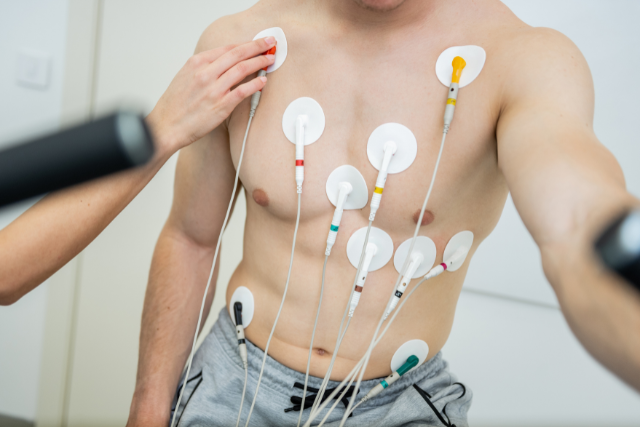Cardiac Electro Physiology
Normally, the heart beats at a steady rhythm to supply blood to the lungs and the rest of the body. For some people, though, the heart beats irregularly. We call this irregular heartbeat an arrhythmia. Their hearts can beat too slowly (bradycardia), too quickly (tachycardia), or too early (premature). When the heart doesn’t beat as it should, normal circulation of the blood can suffer; and when your circulation is irregular, it can cause a wide range of problems, from dizziness and fatigue to stroke and even sudden death.
Cardiac electrophysiology is a branch of cardiology that deals exclusively with the detection and treatment of heart rhythm disorders (arrhythmias), which affect millions of Americans. Electrophysiologists treat arrhythmias using the body’s natural electrical current, using medications, and using artificial sources of electrical current, as well as surgical and non-surgical procedures.

Symptoms
An arrhythmia may be present all of the time or it may come and go. Some people do not experience any symptoms, while others notice symptoms only when they are more active. Common signs include:
- Chest pain
- Disturbed sleep
- Dizziness or lightheadedness
- Confusion
- Fainting
- Fast pulse
- Fatigue
- Heart palpitations (sensation that your heart is pounding or racing)
- Irregular heartbeats (fast or slow)
- Pallor (a pale appearance)
- Premature contractions (extra, early, or “skipped” heartbeats)
- Shortness of breath
- Stroke
- Sweating
Experts Working Together
At the Amrit Heart Care Hospital, patients with common and rare heart rhythm disorders receive advanced diagnostics and innovative treatments from a team of highly skilled electrophysiologists. In addition, our electrophysiologists work in collaboration with other top-ranked cardiac experts at Amrit Heart Care Hospital, including our clinical and interventional cardiologists, as well as our cardiac surgeons.
At Amrit Heart Care Hospital, our electrophysiologists provide highly specialized care for disorders such as atrial fibrillation, the most common type of arrhythmia; supraventricular tachycardia; and ventricular tachycardia. We use a state-of-the-art electrophysiology lab equipped with computer mapping systems that allow our specialists to diagnose and treat a wide range of the most complex arrhythmias and to evaluate fainting (syncope) disorders. In addition, our team of experts utilizes devices, such as pacemakers and defibrillators, to treat arrhythmias.
What Causes Irregular Heartbeats
Arrhythmias can be caused by problems with the heart’s natural electrical system; structural problems in the heart or blood vessels caused by birth defects; heart disease; or induced by medications or exposure to certain certain chemicals and drugs.
